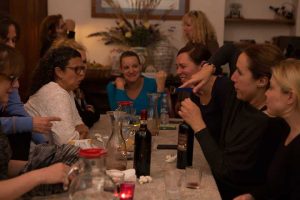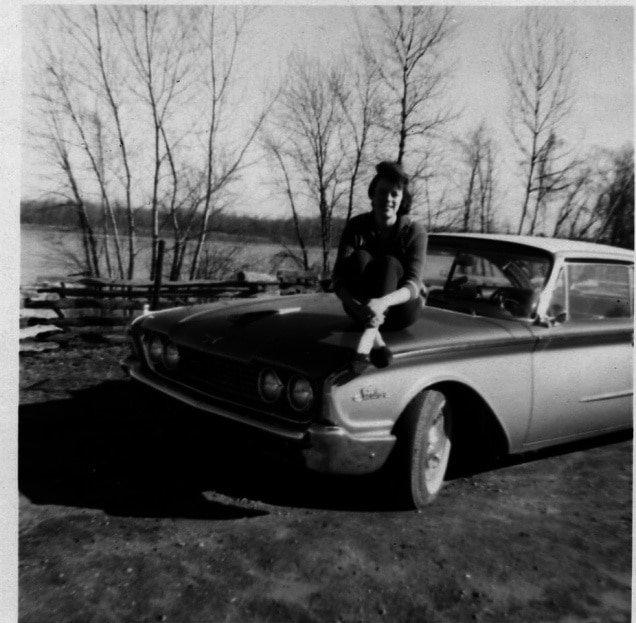By Teri Carter
On January 22, 1973, by a vote of 7-2, the Supreme Court overturned a Texas law and made abortion legal in the United States. Roe v. Wade stated that a woman had the choice to end a pregnancy in early months without legal restriction, and with restrictions in later months. This ruling was based on her right to privacy.
In the years before Roe v. Wade, my mother gave birth to 3 children: in 1965, 1968 and 1972. Her first 2 pregnancies began without a husband, which in the 1960s meant she had to get married twice to men she should never have even considered marrying. My mother did not have the option of ending her pregnancies. She also did not have access to birth control, though Enovid, the first birth control pill approved by the FDA, had been on the market since 1960, and by 1965 was being used by 6.5 million American women.
The Pill was only accessible to married women, and would not be legally available to single women for 7 more years. The Pill would never be approved by the Catholic Church.
***
For decades to come, and until her early death at age 56, my mother carried a massive weight of regret and shame. Regret for mistakes made. Shame within her large, devout, Catholic family, with one aunt who answered her phone, “Hello, Praise the Lord.” Shame within her small Missouri town. And shame within her family’s Sprigg Street church where her father had paraded himself for years as a pillar of purity and faith and righteousness, even has he threw his wife—mother to his 8 children— into the backyard some midnights while sitting inside the door with a rifle, drunk and laughing and daring the whore that she was to try, just try, and come inside.
My grandmother was poor and uneducated and not allowed by her husband to drive a car or to work outside the home or to write a check without his signature, and with so many children to care for, she did not have the choice to leave. She had no rights.
I was born in 1965, the same year the Supreme Court invalidated state laws prohibiting the use of birth control within the confines of marriage, though this did nothing to help my young, single mother: 19, pregnant, and Catholic. She told me she was waitressing full-time at the Pizza King when she learned she was pregnant, and that when she started to show she lost her job because the sight of a young pregnant girl waiting tables, her boss told her, was bad for business.
In an effort to save me from being born illegitimate, my mother waddled into the county courthouse and married my father—a 20 year-old boy, already divorced, with a baby he did not support—and hoped for the best. She give birth. She got a job at the local factory. Her husband divorced her within the year, then disappeared. And my mother, alone with no means to support herself and her new baby, had no choice but to move back in with her parents.
***
In 1967, my mother began dating again. Birth control had become legal for married women, but since my mother was divorced, and therefore single, she had no access to The Pill. And she got pregnant. My grandfather kicked her and her baby (me) out of the house, and though my grandmother begged and begged him to let us stay, my grandmother had no choice in the matter. Her husband was the man of the house.
And so my mother, 22 and broke with a toddler and another baby on the way, went back to the same county courthouse and married husband number two.
I’ve often heard people say that my mother had a choice. That if she did not want to chance getting pregnant, she should have abstained from having sex. It seems so simple, doesn’t it? And yet I’ve never once heard anyone say those words about the men who got her pregnant.
***
My mother delivered baby number two in 1968. A boy. The same year, Pope Paul VI—in direct opposition to the recommendation of his papal commission on birth control— released Human Vitae, reaffirming The Church’s ban on all contraception, excepting the rhythm method.
From The Washington Post: “In 1967, the commission’s report was leaked to the press, revealing that a significant majority of its members favored lifting the ban, including 60 of 64 theologians and nine of the 15 cardinals. The minority who were opposed issued a separate report. After much consideration, the pope issued a formal encyclical, Humanae Vitae (“Of Human Life”) in 1968, siding with the minority and reaffirming the church’s prohibition of any form of artificial birth control.”
My mother, now 23 and with so many mistakes (sins) piling up, did not feel like she could afford another mistake by going against The Church and secretly taking The Pill. She wanted to make things right. She still hoped for an annulment of her first marriage, hoped to be welcomed back to her church by the Monsignor, and longed to be better than what people were saying about her. She wanted to be thought of as “good” again.
Her friends and her older sisters, however, secretly admitted (within their ranks) that they were taking The Pill, though most all of them also confessed they had not gotten The Pill from their doctors. It’s a small town, they said, and in a small town there is no such thing as privacy. What if their parents found out? Their in-laws? Their Church?
If and when they got caught, they insisted to their parents and their priests, and sometimes their husbands, that they used The Pill strictly to manage irregular periods and to lessen the pain and mood swings caused by menstrual cramps. Therefore making them healthier and happier and more available to their husbands. Therefore making them better wives and better mothers.
Therefore making these women … better.
***
It is so easy to talk about choice, who has the choice and who does not, in the abstract. When it’s happening far away, and to someone else.
In 1972, just 2 months before the Roe v. Wade decision, my mother gave birth to her third child. Another boy. I was 7 by then, and what I remember most about those days is the daily tension in our house, and waking in the middle of night to the sound of screaming adults. I would sneak out of my bed and tiptoe to the top of the stairs where I would hang upside down by my toes from the landing and watch my mother and her husband throw anything they could get their hands on—dinner plates, glasses, candle-holders, toys, end tables, lamps—at each other.
Mornings after were filled with silence and regret, a crying baby and the sweeping up of broken glass, and the scratchy sound of my mother’s favorite album on the turntable, Charlie Rich’s deep, sweet seduction on repeat:
And when we get behind closed doors
Then she lets her hair hang down
And she makes me glad I’m a man
Oh no one knows what goes on behind closed doors
***
It is 1973. My mother is 27 years old. About to be twice divorced. With 3 children. Making minimum wage working shifts at the Hosiery Mill. The same year, in a vote of 7-2, the Supreme Court will overturn a Texas law and make the choice to terminate an unwanted pregnancy legal in the United States. Roe v. Wade will state that a woman has the choice to end a pregnancy in early months without legal restriction.
It is 1973, and my mother’s first husband has long-ago gone off to live another life and never paid a penny of child support, while her second husband fights her for custody of his boys. At first, she refuses outright. The thought of it is absurd. What kind of mother gives away her babies?
But when she asks her parents for help, she is told they cannot help with a court case, and that she cannot live with them again. They do not have the room, nor the means, to help her with 3 children. How can she expect such a thing? they ask. She should have thought of this, her father says, before she went and got herself into so much trouble. Before she went and got herself knocked up. Her older sister tells her she will be alone for the rest of her life, because no decent man will ever even look at her again, not with 3 children in tow. And yet, here she is. How will she afford childcare, a home, food? Who will take care of her children when she works nights, or weekends? What choice, her married girlfriends ask, does she have?
And that is how, in 1973, the year of Roe v. Wade and a woman’s right to choose, my mother signs the papers to give away her 4 year old and her new baby to their father. The choice that will keep her from ever feeling she is good again. The choice that will cause her and her children such great suffering. The choice that will gut her, every day, for the rest of her life.


